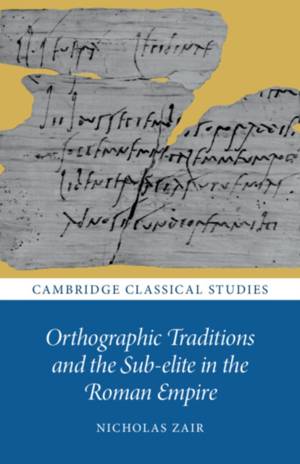
- Afhalen na 1 uur in een winkel met voorraad
- Gratis thuislevering in België vanaf € 30
- Ruim aanbod met 7 miljoen producten
- Afhalen na 1 uur in een winkel met voorraad
- Gratis thuislevering in België vanaf € 30
- Ruim aanbod met 7 miljoen producten
Zoeken
Orthographic Traditions and the Sub-elite in the Roman Empire
Nicholas Zair
€ 57,95
+ 115 punten
Uitvoering
Omschrijving
This book makes use of digital corpora to give in-depth details of the history and development of the spelling of Latin. It focusses on sub-elite texts in the Roman empire, and reveals that sophisticated education in this area was not restricted to those at the top of society. Nicholas Zair studies the history of particular orthographic features and traces their usage in a range of texts which give insight into everyday writers of Latin: including scribes and soldiers at Vindolanda, slaves at Pompeii, members of the Praetorian Guard, and writers of curse tablets. In doing so, he problematises the use of 'old-fashioned' spelling in dating inscriptions, provides important new information on sound-change in Latin, and shows how much can be gained from a detailed sociolinguistic analysis of ancient texts.
Specificaties
Betrokkenen
- Auteur(s):
- Uitgeverij:
Inhoud
- Aantal bladzijden:
- 314
- Taal:
- Engels
- Reeks:
Eigenschappen
- Productcode (EAN):
- 9781009327671
- Verschijningsdatum:
- 8/06/2023
- Uitvoering:
- Paperback
- Formaat:
- Trade paperback (VS)
- Afmetingen:
- 140 mm x 216 mm
- Gewicht:
- 362 g

Alleen bij Standaard Boekhandel
+ 115 punten op je klantenkaart van Standaard Boekhandel
Beoordelingen
We publiceren alleen reviews die voldoen aan de voorwaarden voor reviews. Bekijk onze voorwaarden voor reviews.








